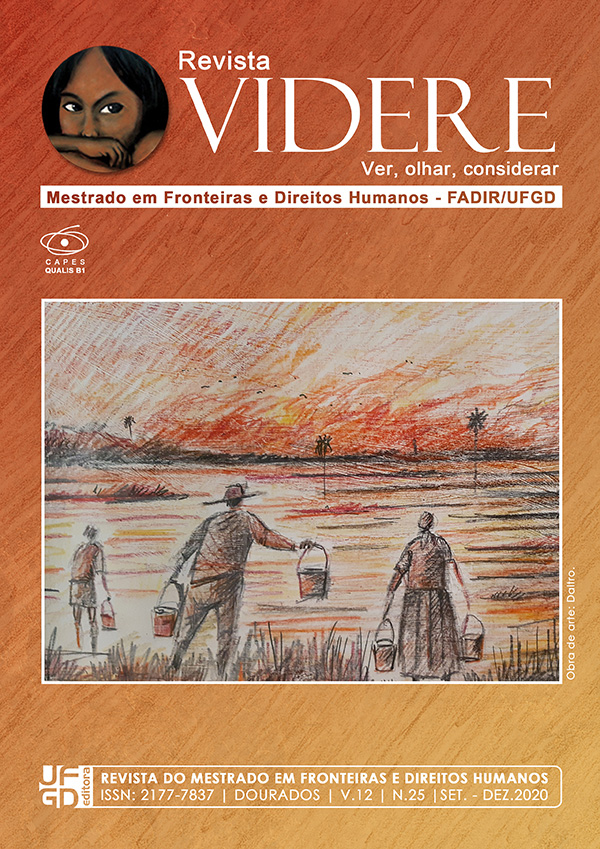For a political economy of punishment from the South: reflections on penal control in contries of dependent capitalism in the Post Big Industry
DOI:
https://doi.org/10.30612/videre.v12i25.11731Keywords:
Political economy of punishment. Post big industry. Capitalism dependent.Abstract
Proposing a historical-structural reading of the penal system and incorporating the legacies of the political economy of punishment studies developed during the XX century, this paper intends to contribute in the updating of these reflections based on the current stage of the capitalist accumulation. It will start from a defense of the topicality of the Karl Marx’s theory of value, tooking especially the formulations of their Grundrisse about the particularities of the subsumption of labor to capital in each capitalist accumulation stage, indicating elements for diagnosis of the contemporary, called "general intellect". This defense will allow us to configure a specific understanding of this stage of the Big Industry, diverging in the details of those post-Fordist conceptions that surpass the category "working class" and the centrality of the capital-labor conflict. From these theoretical contributions, the work will seek to align this general and abstract conceptions about criminal control to the particularities of criminal control at this stage, all to diverge, in several forms, from the eurocentric readings of the overcoming of the discipline of need and the achievement of governance of excess (positive or negative) through the development of new power in the "control society" stage, with the presence of an actuarial type of criminal system. On the other hand, although far from a counterposition to such fundamental elaborations, we will claim the tradition of the univen and combined development of capitalism to demonstrate how the penal system is configured in dependent and peripherical countries in the phase of the Post Big Industry, and their relation with the constitutive characteristis of an extermination system.Downloads
References
ANTUNES, Ricardo. Adeus ao trabalho?: Ensaio sobre as metamorfoses e a centralidade do mundo do trabalho. Campinas: Editora da Universidade Estadual de Campinas, 2006.
PAVARINI, Massimo. Control y dominación: teorías criminológicas burguesas y proyecto hegemónico. Buenos Aires: Siglo XXI Editores Argentina, 2002.
PACHUKANIS, Evgeny Bronislavovich. Teoria geral do direito e marxismo. São Paulo: Acadêmica, 1988.
MOURA, Clóvis. Dialética Radical do Brasil Negro. São Paulo: Editora Anita, 1994.
MÉSZÁROS, István. Para além do capital: rumo a uma teoria da transição. Tradução Paulo Cezar Castanheiras e Sérgio Lessa. São Paulo: Boitempo, 2002.
MENEGAT, Marildo. Estudo sobre ruínas. Rio de Janeiro: Revan/Instituto Carioca de Criminologia, 2012.
MELOSSI, Dario. Discussão à guisa de prefácio. Cárcere, pós-fordismo e ciclo de produção da ‘canalha’. In: GIORGI, Alessandro De. A miséria governada através do sistema penal. Rio de Janeiro: Revan/Instituto Carioca de Criminologia, 2006.
MELOSSI, Dario; PAVARINI, Massimo. Cárcere e fábrica: as origens do sistema penitenciário (século XVI-XIX). Rio de Janeiro: Revan/Instituto Carioca de Criminologia, 2006.
MARX, Karl. Manuscritos econômico-filosóficos. São Paulo: Martin Claret, 2001.
MENEGAT, Marildo. Estudo sobre ruínas. Rio de Janeiro: Revan/Instituto Carioca
de Criminologia, 2012.
HARDT, Michael; NEGRI, Antonio. Império. Tradução de Berilo Vargas. 2 ed. Rio de Janeiro: Record, 2001.
GIORGI, Alessandro De. A miséria governada através do sistema penal. Rio de Janeiro: Revan, 2006.
GÓES, Luciano. A “tradução” de Lombroso na obra de Nina Rodrigues. O racismo como base estruturante da criminologia brasileira. Rio de Janeiro: Revan, 2016.
FLAUZINA, Ana Luiza Pinheiro. Corpo negro caído no chão: o sistema penal e o projeto genocida do Estado Brasileiro. 2006. 145 f. Dissertação (Mestrado em Direito) - Universidade de Brasília, Brasília, 2006.
FERNANDES, Florestan. Mudanças sociais no Brasil. São Paulo: Global, 2008.
CASTRO, Lola Aniyar. Criminologia da Libertação. Rio de Janeiro: Revan, 2005.
PRADO, Eleutério. Desmedida do valor: crítica da pós-grande indústria. São Paulo: Xamã, 2005.
YOUNG, Jock. A sociedade excludente: exclusão social, criminalidade e diferença
na modernidade recente. Tradução de Renato Aguiar. Rio de Janeiro: Revan: ICC, 2002.
Downloads
Published
How to Cite
Issue
Section
License
Authors must accept the publication rules when submitting the journal, as well as agree to the following terms:
(a) The Editorial Board reserves the right to make changes to the Portuguese language in the originals to maintain the cultured standard of the language, while respecting the style of the authors.
(b) Authors retain the copyright and grant the journal the right to first publication, with the work simultaneously licensed under the Attribution-NonCommercial-ShareAlike 3.0 Brazil (CC BY-NC-SA 3.0 BR) that allows: Share - copy and redistribute the material in any medium or format and Adapt - remix, transform, and create from the material. CC BY-NC-SA 3.0 BR considers the following terms:
- Attribution - You must give the appropriate credit, provide a link to the license and indicate whether changes have been made. You must do so under any reasonable circumstances, but in no way that would suggest that the licensor supports you or your use.
- NonCommercial - You may not use the material for commercial purposes.
- Sharing - If you remix, transform, or create from material, you must distribute your contributions under the same license as the original.
- No additional restrictions - You may not apply legal terms or technological measures that legally restrict others from doing anything that the license permits.
(c) After publication, authors are allowed and encouraged to publish and distribute their work online - in institutional repositories, personal page, social network or other scientific dissemination sites, as long as the publication is not for commercial purposes.



















